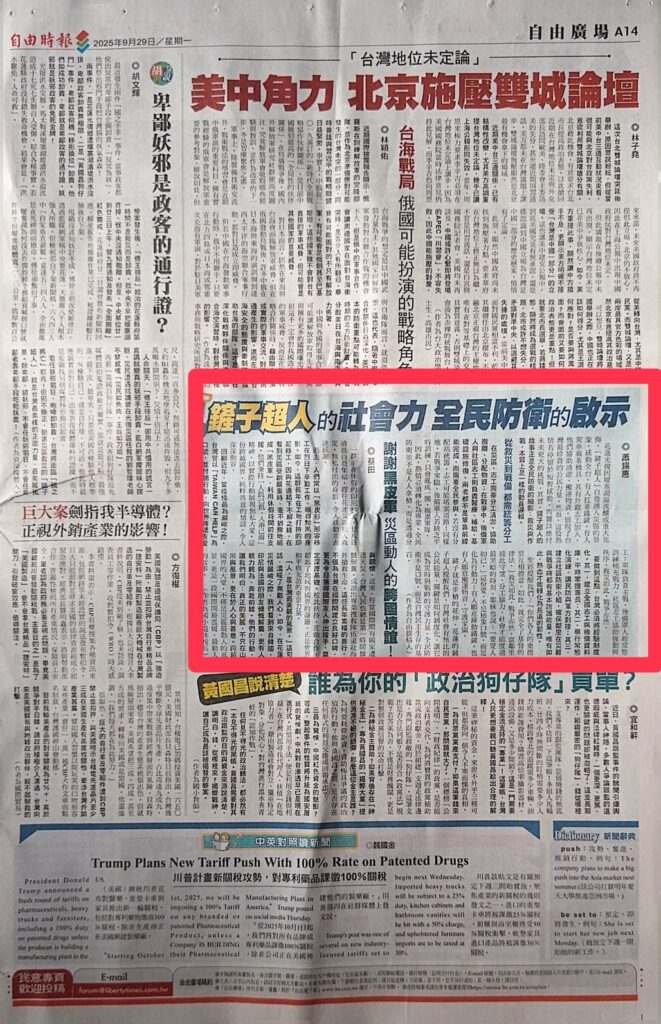蕭錫惠 | Hsiao Hsi-Hui
「鏟子超人」的社會力 全民防衛的啟示
花蓮光復因堰塞湖溢流釀成重大死傷,「鏟子超人」自發湧入災區的景象,感動全台。有人扛著鐵鏟,有人駕車載著機具,甚有外籍志工加入,他們協助清淤、搬運物資,展現了台灣最珍貴的公民力量。然而,這股熱情若停留於短暫感動,將難以應付未來更大的挑戰。其實,鏟子超人的故事正是全民防衛的縮影:救災與作戰,本質上是一樣的動員邏輯。
從救災到戰備 都需統籌分工
在災區,志工需要分工清淤、協助撤離、分配物資;在戰爭中,後備軍人與社區志工則負責醫療、補給、基礎設施修復。兩者都不是單靠前線能完成,而需要全民參與。若沒有分配站統籌,志工可能堵塞道路;同樣地,若戰爭來臨,後備軍人若缺乏平時訓練,只會亂成一團,拖累軍隊。
因此,熱情必須轉化為專業。全民防衛並不是人人拿槍,而是透過分工:軍隊負責主戰,後備軍人經常態訓練補充戰力,社區志工協助後勤與秩序。救災如此,戰爭亦然。
要做到這點,台灣必須將經驗制度化。其一,建立全國志工與後備資料庫,平時掌握專長;其二,舉行常態化演練,讓民防與軍方對接;其三,建立社區防衛小組,確保鄰里在災難與戰爭時都有基本防護能量。唯有如此,熱血才能轉化為長遠的韌性。
聖經提醒我們:「你們各人的重擔要互相擔當,如此,就完全了基督的律法。」救災如此,戰爭亦然。當鄰里彼此守望、分工協力,社會才能度過最黑暗的時刻。耶穌也說:「要愛人如己。」這份愛,不是抽象口號,而是化為行動力:有人願意揮動鐵鏟,也有人願意搬運物資、守護家園。
鏟子就是步槍的延伸。花蓮的鏟子超人提醒我們,台灣社會有無比的公民能量,關鍵是如何制度化,讓它成為災時與戰時的守護力量。全民防衛不是口號,而是台灣民主生存的基石。
“Shovel Supermen” and the Power of Society: Lessons for Total Defense
The devastating overflow of a barrier lake in Guangfu, Hualien, caused major casualties, yet the sight of “Shovel Supermen” spontaneously rushing into the disaster zone touched the entire nation. Some carried shovels, some drove vehicles hauling machinery, and even foreign volunteers joined in. They helped with dredging and moving supplies, showcasing Taiwan’s most precious civic strength. However, if this passion remains only a fleeting moment of emotion, it will be hard to meet the greater challenges ahead. In fact, the story of the Shovel Supermen is a microcosm of total defense: disaster relief and warfare share the same mobilization logic.
From Disaster Relief to War Preparedness: Both Require Coordination and Division of Labor
In disaster zones, volunteers must be assigned to dredging, assisting evacuation, and distributing supplies. In wartime, reservists and community volunteers take on medical support, logistics, and infrastructure repair. Neither can be accomplished by the frontline alone; both require the participation of the entire population. Without distribution centers to coordinate, volunteers could clog the roads; likewise, in war, if reservists lack regular training, they will become a burden and hinder the armed forces.
Therefore, passion must be transformed into professionalism. Total defense does not mean everyone carries a gun, but that society functions through division of labor: the military fights on the frontlines, reservists undergo regular training to supplement combat power, and community volunteers assist in logistics and maintaining order. Disaster relief is like this, and so is war.
Institutionalizing Experience: Building Long-Term Resilience
To achieve this, Taiwan must institutionalize experience. First, establish a national database of volunteers and reservists, keeping track of skills during peacetime. Second, conduct regular drills to integrate civil defense with the military. Third, create community defense teams to ensure that neighborhoods have basic protection capacity during disasters and war. Only then can passion be transformed into lasting resilience.
The Bible reminds us: “Carry each other’s burdens, and in this way you will fulfill the law of Christ.” Disaster relief is like this, and so is war. When neighbors watch over one another and cooperate in division of labor, society can survive its darkest moments. Jesus also said: “Love your neighbor as yourself.” This love is not an abstract slogan, but action: some are willing to swing the shovel, others to transport supplies and guard their communities.
The shovel is an extension of the rifle. The Shovel Supermen of Hualien remind us that Taiwan has immense civic energy. The key is how to institutionalize it, making it a protective force in times of disaster and war. Total defense is not a slogan—it is the cornerstone of Taiwan’s democratic survival.

